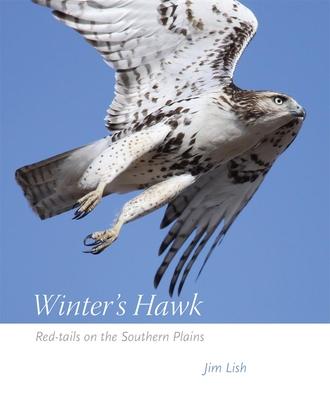
Every autumn, thousands of migrating Red-tailed Hawks arrive on the southern Great Plains to spend the winter, and Oklahoma is one of the best places to observe this amazing phenomenon. Above the prairie, as Oscar Hammerstein wrote, they make "lazy circles in the sky," but not for entertainment, theirs or ours. Author Jim Lish draws on more than forty years' experience as a professional biologist and ornithologist to present almost two hundred color photographs of Red-tails and relate important lessons in southern Great Plains biodiversity, underscoring the place of the Red-tailed Hawk in Oklahoma's tallgrass prairie ecology. Winter's Hawk introduces the reader to the hawk's biology, social behavior, and useful role in limiting destructive rodent populations. In sharing many anecdotes from his long experience in the field, Lish describes the hunting techniques of Red-tails, their competition with other raptors, and their behavior in the presence of human observers. He describes the subtle differences in plumage, and other characteristics between the various subspecies of Red-tailed Hawks that winter here. His account of their behavior includes intergenerational warfare, in which young Red-tails are frequently the losers. Detailed and scientifically accurate, this informal, jargon-free account will appeal to birders, sportsmen, naturalists, and falconers, as well as biologists. Red-tails can see ultraviolet light, which enables them to easily locate trails left by rodents. Cotton rats are by far their most important winter food, but they also eat carrion, large snakes, medium-sized mammals, and smaller birds. The main motive for the birds' behavior, Lish reminds us, is survival, and he includes birds'-eye views of the hazards Red-tails face: foot injuries, damage to feathers, starvation, electrocution, and illegal shooting. A treasure trove of rich descriptive writing and astonishing photographs, Winter's Hawk inspires readers to help preserve these magnificent birds of prey so that future generations may see a Red-tail standing sentinel over a field or circling above it.
Every autumn, thousands of migrating Red-tailed Hawks arrive on the southern Great Plains to spend the winter, and Oklahoma is one of the best places to observe this amazing phenomenon. Above the prairie, as Oscar Hammerstein wrote, they make "lazy circles in the sky," but not for entertainment, theirs or ours. Author Jim Lish draws on more than forty years' experience as a professional biologist and ornithologist to present almost two hundred color photographs of Red-tails and relate important lessons in southern Great Plains biodiversity, underscoring the place of the Red-tailed Hawk in Oklahoma's tallgrass prairie ecology. Winter's Hawk introduces the reader to the hawk's biology, social behavior, and useful role in limiting destructive rodent populations. In sharing many anecdotes from his long experience in the field, Lish describes the hunting techniques of Red-tails, their competition with other raptors, and their behavior in the presence of human observers. He describes the subtle differences in plumage, and other characteristics between the various subspecies of Red-tailed Hawks that winter here. His account of their behavior includes intergenerational warfare, in which young Red-tails are frequently the losers. Detailed and scientifically accurate, this informal, jargon-free account will appeal to birders, sportsmen, naturalists, and falconers, as well as biologists. Red-tails can see ultraviolet light, which enables them to easily locate trails left by rodents. Cotton rats are by far their most important winter food, but they also eat carrion, large snakes, medium-sized mammals, and smaller birds. The main motive for the birds' behavior, Lish reminds us, is survival, and he includes birds'-eye views of the hazards Red-tails face: foot injuries, damage to feathers, starvation, electrocution, and illegal shooting. A treasure trove of rich descriptive writing and astonishing photographs, Winter's Hawk inspires readers to help preserve these magnificent birds of prey so that future generations may see a Red-tail standing sentinel over a field or circling above it.
Paperback
$24.95